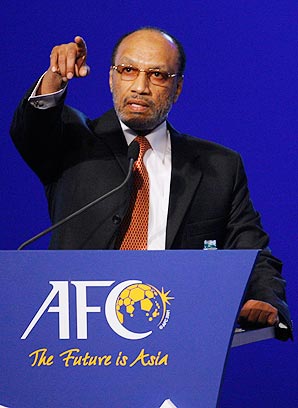FIFA executive breaks code of silence on executive-committee pay
For an organization that claims to care about transparency, however, FIFA refused to specify how much each elected executive committee member is paid. And when asked if the executive committee voted to give its members personal bonuses from the $2.4 billion profits of World Cup 2010, two executive committee members quickly ended their phone conversations with SI.com.
"I don't discuss matters [that occur] in a private room in a confidential meeting," said Geoff Thompson, a FIFA executive committee member from England. "That's my principles, and I'm not moving off. Bye!"
"You can ask me anything about medicine in football, but not about anything else," said Michel D'Hooghe, a FIFA executive committee member from Belgium who is the chairman of FIFA's medical committee.
FIFA's media office refused to provide any specific answers to SI.com's request for information on pay packages for individual FIFA executive committee members or for the salary, expenses and reimbursements for FIFA president Sepp Blatter.
"As is the case for most private companies and organizations, the information related to individual fees or daily allowances is not public," FIFA said in a written statement.
But FIFA is not a private company. It is a nonprofit organization that receives enormous tax breaks from the Swiss government as a result. If FIFA were based in the United States instead of Switzerland, it would be required to publicly report all of its individual directors' fees, just like any other nonprofit organization. But that kind of transparency is not something that Blatter's FIFA is willing to embrace.
Not everyone in FIFA sees the need for secrecy, however. Mohamed bin Hammam, a FIFA executive committee member from Qatar who is challenging Blatter for the FIFA presidency, told SI.com that he made 200,000 euros ($281,720) from his FIFA duties in 2010. Bin Hammam added that he believed other executive committee members (aside from Blatter, who spends far more time on the job) earned the same amount in 2010.
"We don't get any salaries," Bin Hammam said. "We are only getting bonuses [and FIFA expense reimbursements]." One FIFA source told SI.com that personal bonuses for the executive committee are larger in years when FIFA's profits are higher, as was the case in 2010.
Bin Hammam, a wealthy businessman, insisted that he did not collect his $281,720 for 2010, saying: "If you go to FIFA and ask them, 'How much do you owe Bin Hammam?' they will tell you how much money I have with FIFA. ... It is there in my name and it belongs to me. I don't collect it. I don't collect most of it, let me say. But this is not only me. I believe most of my colleagues are the same.
"I don't think FIFA has to hide anything. It is not in FIFA's interests, and not in the interests of the people who are receiving this," said Bin Hammam, who promised that FIFA would reveal "100 percent" of its pay packages for the president and executive committee if he is elected. "Why should we make this so secret and make the public always have a question about it?"
Bin Hammam provided considerably more detail than FIFA was willing to give.
FIFA's media office refused to confirm or deny Bin Hammam's figures. Instead, it sent a link to the 2010 FIFA financial report. The report states that FIFA's "key management personnel" received "short-term employee benefits" of $32.6 million in 2010, a sharp spike upward from $20.9 million in 2009 and $18.5 million in 2008.
When asked to explain what comprised "short-term employee benefits," FIFA responded that they "include the total compensation including wages, salaries and variable compensation as well as daily allowances."
But FIFA provided no new details when pressed to explain exactly how many "key management personnel" there are in FIFA who together collected $32.6 million in 2010.
"Members of the executive committee, the finance committee and the FIFA management, in particular the directors, are regarded as key management personnel," read FIFA's statement to SI.com, repeating verbatim what was already in its financial report.
FIFA's response ignored questions from SI.com, such as:
• How many "key management personnel" are there?
• Which "directors" does this passage refer to?
FIFA was also unwilling to comment on how much money Blatter makes for running the organization.
FIFA's language is so obtuse, in fact, that Bin Hammam -- himself a member of the six-man FIFA finance committee headed by chair Julio Grondona and deputy chair Jack Warner -- had no idea what the term "key management personnel" referred to when asked about it.
"Key management personnel? Maybe this is professional stuff," Bin Hammam said. "Maybe it meant professional stuff, not for the executive committee?"
If a key member of FIFA's own finance committee doesn't understand FIFA's impenetrable phrasing, how is the public supposed to figure it out?
Sports Illustrated senior writer Grant Wahl, SI's soccer columnist, announced his outsider candidacy for FIFA president on Feb. 17.





